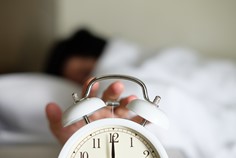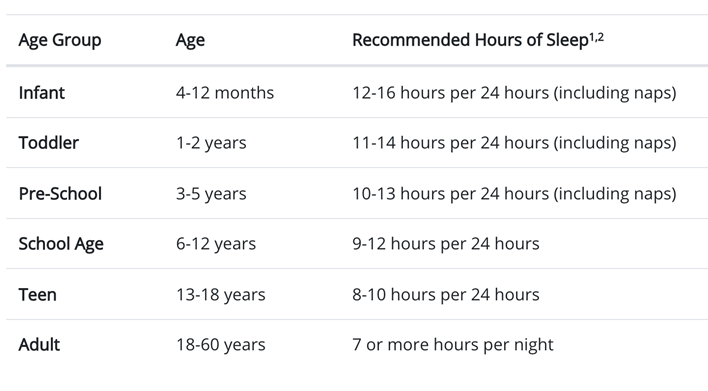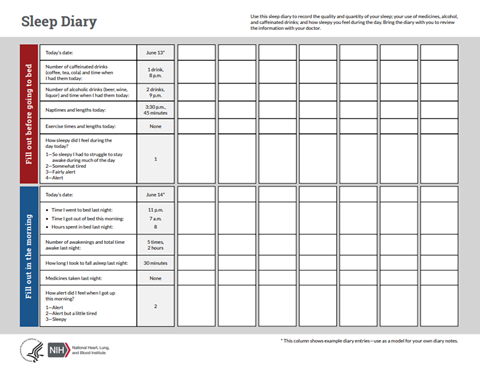Danielle Hoven, Shay Stewart, and Victoria Mrowka

Sleep Hygiene
According to the Centers for Disease Control and Prevention (CDC), about a third of US adults report getting less than the recommended amount of sleep, which is 7 or more hours in a 24-hour period. In the state of Minnesota, it was reported that about 29% of adults usually sleep <7 hours. In MN, health risk factors were higher amongst adults who slept less than recommended time per night, compared to those who slept ≥7 hours. These health risk factors included obesity, physical inactivity, current smoking and excessive alcohol intake. Chronic conditions in MN were also considered significantly higher for adults who slept <7 hours compared to those who slept ≥7 hours; this included heart attacks, stroke, asthma, chronic obstructive pulmonary disease (COPD), arthritis, depression, chronic kidney disease (CKD) and diabetes, according to data in 2014. Getting enough sleep is something people need for good health and allow individuals to make healthier decisions for themselves and their families.
Curious about more information regarding quality sleep hygiene? Below are a few tips and tricks to improving your sleep or use the Sleep Diary below to track your sleep or even visit the CDC website to either listen or read the podcast on “Rest Easy,” for quality information on sleep hygiene https://tools.cdc.gov/medialibrary/index.aspx#/media/id/335023.
Hours Needed
Below is a table from the Centers for Disease Control and Prevention (CDC) that shows the hours of sleep needed for ages 4 months to 60+ years.

Why Are Adults Not Getting Enough Sleep?
Causes of inadequate sleep may include lifestyle (using technology late at night, inconsistent sleep patterns), occupational factors (working long hours or shift work), medical conditions, medications, sleep disorders and sleep apnea. Any one of these factors can affect how well and how long an individual sleeps.
How Sleep Affects Our Bodies
Sleep amount and quality helps us to concentrate, learn, react quickly, make decisions, create memories, and function optimally in our everyday lives. According to the American Thoracic Society, a reduction in sleep by one hour can affect both your decision making and reaction times the following day. Inadequate sleep has been associated with the following conditions:
- Depression
- Diabetes
- Heart disease
- Stroke
- Weight gain
- High blood pressure
- Kidney disease
Sleep Hygiene Tips According to the CDC and American Thoracic Society
- Allow yourself enough time to achieve recommended sleep hours
- Set up a consistent bedtime
- Create an optimal sleep environment (dark, cool, quiet)
- Perform a bedtime routine, such as showering, brushing teeth, etc.
- Exercise at least 30 minutes during the daytime most days of the week
- Use your bed only for sleeping and avoid watching TV, reading, or listening to music
What to Avoid According to the CDC and American Thoracic Society
- Using electronics and bright lights 1 hour before bedtime
- Avoid naps at least 6 hours before bedtime
- Large meals, caffeine, and alcohol before bedtime
- Tobacco use
- Drinking many beverages before bed (to avoid having to use the restroom)
- Exercising within 3 hours of bedtime
- Consider removing pets from your bedroom if this interferes with your sleep
Track Your Sleep
- There are many sleep diaries and trackers available to help you identify areas for improvement in your sleep habits and hygiene.

Additional Resources:
- https://tools.cdc.gov/medialibrary/index.aspx#/media/id/335023
- https://www.nhlbi.nih.gov/health-topics/all-publications-and-resources/sleep-diary
- https://www.sleepfoundation.org/sleep-diary
References:
American Thoracic Society. (2020, March). Healthy sleep in adults. https://www.thoracic.org/patients/patient-resources/resources/healthy-sleep-in-adults.pdf#:~:text=Most adults need about 7-9 hours of sleep,expect to function well with so little sleep.
Centers for Disease Control and Prevention. (2016, November). Sleep and health among adults in Minnesota. https://www.cdc.gov/sleep/pdf/states508/FS_ShortSleepByState_MN_508tagged.pdf
Centers for Disease Control and Prevention. (2020, April 15). Sleep and sleep disorders. https://www.cdc.gov/sleep/index.html
Centers for Disease Control and Prevention. (2020, April 1). Tips to help you fall asleep. https://www.cdc.gov/niosh/emres/longhourstraining/tips.html
Centers for Disease Control and Prevention. (2016, July 15). Tips for better sleep. https://www.cdc.gov/sleep/about_sleep/sleep_hygiene.html
National Heart, Lung, and Blood Institute. (2019, January). Sleep diary. https://www.nhlbi.nih.gov/health-topics/all-publications-and-resources/sleep-diary